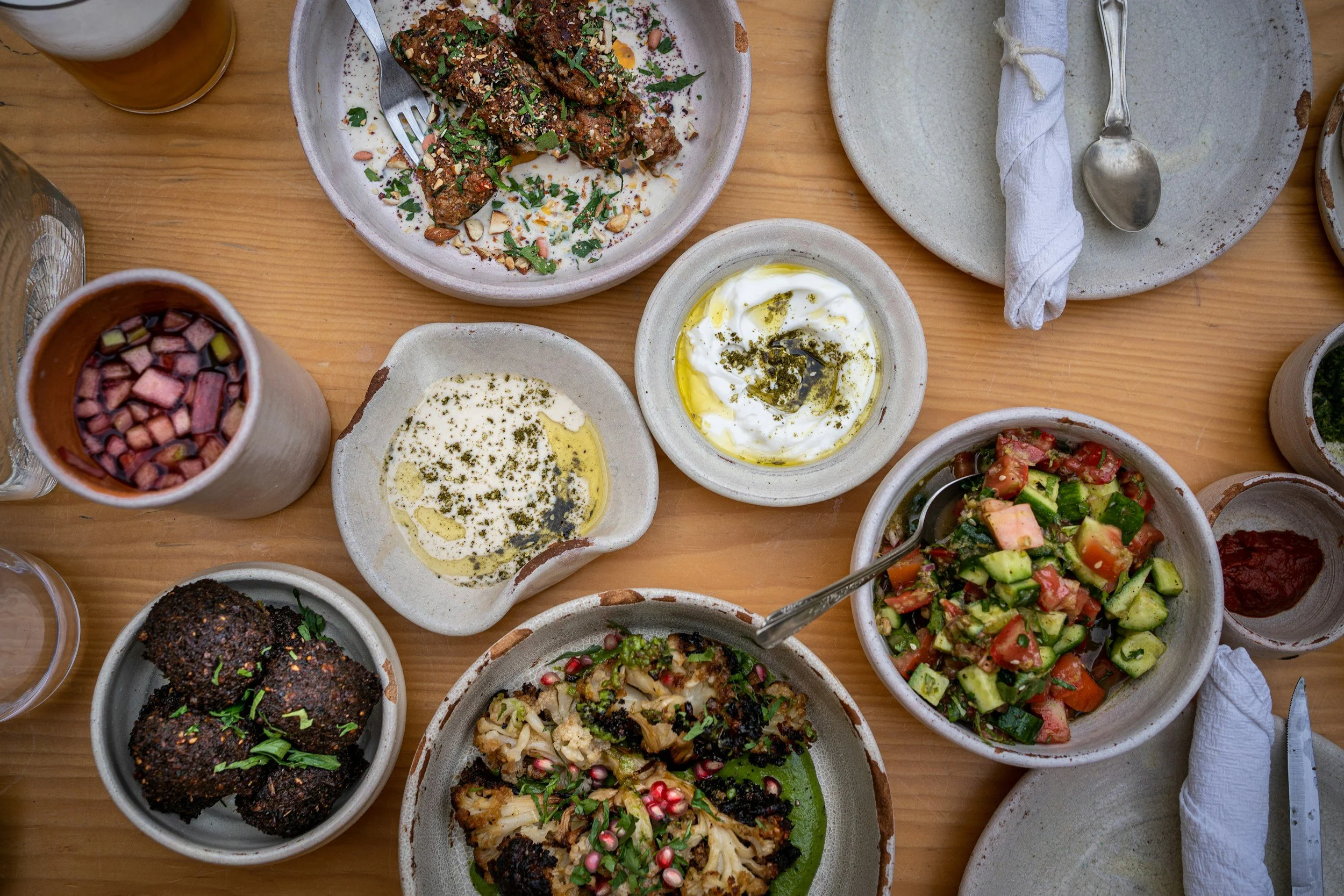The Benefits of the Mediterranean Diet for Perimenopause
Growing up as a Greek Australian, I've developed a deep-seated love and passion for Mediterranean food that is both personal and cultural. Born in Australia, my family moved to Greece when I was just three years old. I was raised in a quaint village nestled in the Greek mountains, steeped in rich culture and surrounded by the warmth of numerous relatives. Our way of life placed food at the heart of our celebrations and traditions, with gatherings often centered around the joys of cooking and savouring delicious meals together. I fondly remember the countless hours spent observing my yiayia (grandmother) and theas (aunts) as they prepared incredible traditional dishes. They crafted homemade sausages, meticulously rolled filo pastry by hand, and slow-cooked delectable vegetable stews. I remember the tantalising aromas of baked fish, meat, and veggies flowing through our home. Our connection to food went beyond just cooking — we also embraced sustainable practices like walking to the local dairy for fresh milk to make our own yogurt. As a child, my adventures often included roaming the local fields, appreciating the land that gave us these incredible flavors. This upbringing ingrained in me a slight bias towards the Mediterranean diet, as it evokes cherished memories and a sense of belonging.
Introduction to Perimenopause
Perimenopause—the transitional phase leading up to menopause—can be a challenging time for many women. This often begins in a woman’s 40s and can last several years, marked by fluctuating hormone levels. These hormonal shifts can bring about a variety of symptoms, including hot flashes, weight gain, mood swings, irregular periods, fatigue, and changes in bone density.
While this phase is entirely natural, its impact on daily life can sometimes feel overwhelming. Among the plethora of advice for easing the experience of perimenopause, one recommendation frequently stands out for both its simplicity and effectiveness—the Mediterranean diet.
This eating pattern, renowned for its heart-healthy and anti-inflammatory properties, offers a balanced, nutrient-rich way to support women's health during perimenopause and beyond.
This detailed guide explores the role of the Mediterranean diet in managing perimenopause symptoms and how it nourishes your body through this significant life stage.
Overview of the Mediterranean Diet
The Mediterranean diet is more than just a way of eating—it’s a lifestyle inspired by the traditional culinary habits of countries bordering the Mediterranean Sea, like Greece, Italy, and Turkey. It's been lauded for its ability to promote longevity and protect against chronic diseases.
Here are the core principles of the Mediterranean diet to set the foundation for our discussion:
Plant-Based Foods: A diet rich in vegetables, fruits, whole grains, nuts, seeds, and legumes.
Healthy Fats: A focus on heart-healthy fats from sources like olive oil, avocados, and nuts.
Lean Protein: Moderate consumption of dairy, fish, and poultry, with red meat consumed only occasionally.
Herbs and Spices: Flavouring meals with fresh and dried herbs to minimise the need for excessive salt.
Wine in Moderation: Red wine is included sparingly in social settings (and always optional).
Unlike fad diets, this eating pattern prioritises a sustainable, balanced, and nutrient-dense approach to eating. It’s a calorie-rich, wholesome feast for your body rather than being restrictive or depriving.
Research and Science Behind the Mediterranean Diet and Perimenopause
Scientific studies strongly advocate the Mediterranean diet for women experiencing perimenopause. Why? Because its nutrient composition is uniquely suited to offset many of the challenges during this period.
For instance:
Hormonal Balance: Research demonstrates that plant-based foods and healthy fats help stabilise fluctuating estrogen levels, potentially reducing mood swings and hot flashes.
Inflammation Reduction: The Mediterranean diet’s anti-inflammatory properties may help alleviate joint pain and other inflammation-related symptoms associated with perimenopause.
Gut Health Support: The high-fibre intake supports gut bacteria, which play a critical role in digestion and overall health. This is especially important, as many women experience bloating, constipation, or other gut issues during perimenopause.
Studies also indicate that women following the Mediterranean way of eating are likely to experience fewer significant weight changes and better cardiovascular outcomes, two areas of concern for women undergoing perimenopause.
Words of wisdom-
The Mediterranean diet offers you the chance to enjoy food without guilt or obsessing over calories—this is not beneficial for your mind or body. Rather than focusing on the items you should be cutting out, shift your mindset to the amazing array of foods you could be adding.
The Specific Health Benefits of the Mediterranean Diet in Perimenopause
1. Weight Management Without Calorie Restriction
Perimenopausal women often notice weight gain around the abdomen due to slower metabolism and hormonal shifts. Unlike restrictive diets, the Mediterranean diet offers a more sustainable way to maintain a healthy weight because it discourages "dieting" and focuses on nutrient-dense foods.
Why It Works: The abundance of vegetables, whole grains, and healthy fats helps you feel full longer, while lean proteins help maintain muscle mass.
2. Better Heart Health
Perimenopause increases the risk of heart disease due to declining estrogen levels. Healthy fats from olive oil, avocados, and nuts—key staples of the Mediterranean diet—support cardiovascular health by reducing bad cholesterol (LDL) and increasing good cholesterol (HDL).
3. Stronger Bones
During this transitional phase, bones can weaken due to lower levels of estrogen, making women more susceptible to osteoporosis.
Sources of Calcium and Vitamin D:
Calcium-rich foods in the diet include leafy greens, sesame seeds (like the tahini used in hummus), and sardines.
Vitamin D can come from fatty fish such as salmon, mackerel, egg yolks, and moderate sun exposure.
4. Improved Gut Health
Gut health plays an underrated but crucial role in overall well-being, and it can be significantly impacted during perimenopause. Symptoms like bloating and constipation are common, and the Mediterranean diet—with its focus on high-fibre foods—can alleviate these issues.
Why It Works:
High-fibre whole grains (like quinoa or bulgur) promote a healthy microbiome.
Fermented foods such as yogurt and olives encourage good gut bacteria.
Nutrient Spotlight: Why Key Ingredients Matter
The Mediterranean diet isn’t just delicious—it’s packed with nutrients that specifically benefit women in perimenopause. Here’s a breakdown of the star nutrients and their roles during this stage:
Whole Grains
Importance: Clean sources of whole grains (e.g., brown rice, farro, or barley) provide steady energy and fibre to regulate digestion and blood sugar levels.
How to Enjoy: Incorporate a flavourful tabbouleh salad made with bulgur wheat or pair your lentil soup with crusty whole grain bread.
Healthy Fats
Importance: Omega-3 fatty acids and monounsaturated fats fight inflammation, promote heart health, and support brain functions.
Best Sources: Olive oil, avocados, nuts, and fatty fish like salmon and tuna.
Lean Protein
Importance: Essential for maintaining muscle mass, which often decreases during perimenopause.
How to Enjoy: Grilled herb-marinated chicken breast or baked fish drizzled with lemon and olive oil.
Fibre
Importance: Supports gut health and reduces bloating.
Sources: Chickpeas in hummus, lentils in soups, or vibrant salads featuring cucumbers, tomatoes, spinach, and arugula.
Calcium and Vitamin D
Importance: Vital for bone health and preventing osteoporosis.
Sources: Sardines, Greek yogurt, almonds, and fortified plant-based milks.
Practical Tips for Adopting the Mediterranean Diet
Changing your eating habits doesn’t have to be daunting. Here are some straightforward tips to help make the Mediterranean diet work for you, even with a busy lifestyle:
Start Simple
Build meals around fresh vegetables, olive oil, and simple proteins like fish or legumes.
For a quick snack, try Greek yogurt with honey and a sprinkle of nuts.
Cook More Meals at Home
Use simple ingredients like garlic, oregano, paprika, and olive oil to flavour your dishes. Think roasted eggplant, grilled zucchini, or oven-baked salmon.
Make Mealtime Enjoyable
Take inspiration from Mediterranean cultures by making meals social events. Even if you’re eating alone, set the table, and savour each bite slowly.
Experiment with Mediterranean Favourites
Get creative and implement regional flavours into your kitchen. Some ideas:
Greek Foods: Try a fresh Greek salad with kalamata olives, feta, and cucumbers.
Turkish Foods: Whip up some creamy baba ganoush (roasted eggplant dip).
Moroccan Flavours: Roast chickpeas with cumin and harissa for a snack.
The Mediterranean diet offers a sustainable, balanced, and utterly delicious way to support your health during perimenopause. By nourishing your body with wholesome, nutrient-packed foods, you'll be better equipped to manage symptoms, maintain energy, and feel vibrant during this important life phase.
Remember, it’s not about calorie restriction or deprivation. It’s about choosing foods that fill you with energy and support a healthy transition into the next chapter of your life.
Take the first step today and start incorporating more Mediterranean-inspired meals into your routine.
References and Additional Resources
Harvard Health Publishing. (2021). “The Mediterranean Diet.”
Cano A. et al. The Mediterranean diet and menopausal health: an EMAS position statement.
Final word from me…
The Mediterranean diet offers you the chance to enjoy food without guilt or obsessing over calories—this is not beneficial for your mind or body. Rather than focusing on the items you should be cutting out, shift your mindset to the amazing array of foods you could be adding. Embrace the rich flavours of vibrant salads, savoury whole grains, and succulent lean proteins. As you indulge in these nutrient-packed options, you'll find there soon won't be room for processed foods. Nourish yourself with love and enjoy each meal as a celebration of health and well-being.


